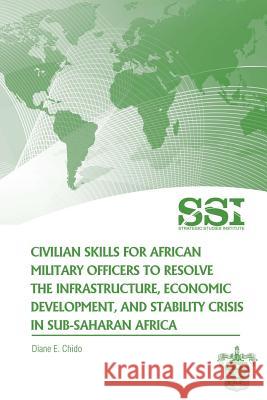Civilian Skills for African Military Officers to Resolve the Infrastructure, Economic Development, and Stability Crisis in Sub-Saharan Africa » książka
Civilian Skills for African Military Officers to Resolve the Infrastructure, Economic Development, and Stability Crisis in Sub-Saharan Africa
ISBN-13: 9781477556030 / Angielski / Miękka / 2012 / 54 str.
Civilian Skills for African Military Officers to Resolve the Infrastructure, Economic Development, and Stability Crisis in Sub-Saharan Africa
ISBN-13: 9781477556030 / Angielski / Miękka / 2012 / 54 str.
(netto: 60,68 VAT: 5%)
Najniższa cena z 30 dni: 63,37 zł
ok. 16-18 dni roboczych
Bez gwarancji dostawy przed świętami
Darmowa dostawa!
In the United States, we often think of the military as an alternative to college, as a professional training ground, for a wide variety of skills that may include computer science, electronics, cooking, or medicine. We have comprehensive job placement and support programs for separating service members. Our military training includes discipline, teaming concepts, and a respect for civil society, traits expected to remain with a military member for life. Through U.S. Africa Command (USAFRICOM) partnership programs in Sub-Saharan Africa, many officers are currently benefitting from military-to-military training opportunities to learn aspects of military science and other basic training. A small number of officers will gain valuable skills they can use throughout their military careers or even in civilian life. Ms. Diane Chido argues that if our own military service members on separation or retirement faced return to their hometowns with uncertain pension payments and no transferable skills, along with a sudden loss of purpose and prestige, our country would not be as stable as it is. Remove our consistent training in discipline, respect for civilian authority, and loyalty to the national structure, and we have a greater chance of instability. If we add a complete lack of energy, telecommunications, and transportation infrastructure to support even basic economic development, we have a situation resembling that of many ethnically divided African countries, with no employment opportunities in the civilian sphere and where the rule of law exists only for some. Retirement-age military officers have historically engaged in coups in numerous African countries, and frequently civil wars reignite, even with robust disarmament, demobilization, and reintegration (DDR) programs. If these experienced officers, accustomed to leading and doing, are given the skills to manage construction projects and the knowledge to design and build power stations, dams, bridges, and roads, and if noncommissioned officers are trained to run and maintain these projects once built; those who pledged to serve their country in uniform could continue to do so with pride and purpose while wearing mufti. Infrastructure development and enhanced economic opportunity would no longer be entirely reliant on expensive foreign aid and experts. Above all, the threat of destabilization would be reduced.
Zawartość książki może nie spełniać oczekiwań – reklamacje nie obejmują treści, która mogła nie być redakcyjnie ani merytorycznie opracowana.











